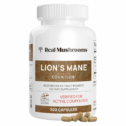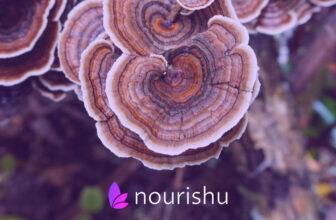Are you looking for a natural way to boost your cognitive function and improve your memory?
Look no further than Lion’s Mane, a type of mushroom known for its powerful brain-boosting properties.
This article covers:
- Understanding Nootropics
- Bioactive Compounds in Lion’s Mane Mushrooms
- Lion’s Mane Mushrooms and Memory Enhancement
- Lion’s Mane Mushrooms and Focus/Concentration
- Lion’s Mane Mushrooms and Neuroprotection
- Lion’s Mane Mushrooms and Brain Plasticity
- How to Incorporate Lion’s Mane Mushrooms into Your Routine
- Conclusion
- FAQ
Lion’s Mane Mushrooms (Real Mushrooms)
Understanding Nootropics
Nootropics, also known as smart drugs or cognitive enhancers, are substances that improve cognitive functions such as memory, focus, creativity, and overall brain health.
While synthetic compounds like piracetam have been widely studied, there is a growing interest in natural and herbal nootropics.
Lion’s mane mushrooms, scientifically known as Hericium erinaceus, have emerged as a promising candidate in improving brain function.
Bioactive Compounds in Lion’s Mane Mushrooms
The cognitive-enhancing effects of lion’s mane mushrooms can be attributed to its bioactive compounds, namely hericenones and erinacines.
These compounds have been shown to stimulate the production of nerve growth factors in the brain, promoting the growth and survival of neurons.
By interacting with the brain, hericenones and erinacines have the potential to enhance cognitive function.
In a 2009, double-blind, placebo-controlled study, participants showed significant cognitive improvement after taking 250mg tablets of dried Lions Mane powder three times a day for 16 weeks.
Source: nih.gov
Lion’s Mane Mushrooms and Memory Enhancement
Memory is a fundamental cognitive function that plays a vital role in daily life, learning, and overall cognitive performance.
Lion’s mane mushrooms have shown promising effects on memory enhancement, making them an intriguing subject of study in the field of cognitive neuroscience.
Effects on Memory Formation and Recall
Research studies have demonstrated the potential of lion’s mane mushrooms to improve memory formation and recall.
In human studies, participants who consumed lion’s mane mushroom supplements or extracts exhibited significant improvements in memory-related tasks compared to control groups.
These tasks included memory recall, recognition, and spatial memory. The memory-enhancing effects of lion’s mane mushrooms were observed in various age groups, suggesting their potential benefits for both young and older individuals.
Neuroprotective Effects on Memory
The neuroprotective properties of lion’s mane mushrooms play a significant role in memory enhancement.
As mentioned earlier, lion’s mane mushrooms contain bioactive compounds, such as hericenones and erinacines, which promote the production of nerve growth factors (NGFs).
NGFs are essential for the growth, survival, and maintenance of neurons, including those involved in memory processes.
By stimulating NGF production, lion’s mane mushrooms support the health and functioning of memory-related brain regions, potentially leading to enhanced memory formation and recall.
Animal Studies and Implications for Human Memory Enhancement
Animal studies have further supported the memory-enhancing effects of lion’s mane mushrooms.
In rodent models, lion’s mane mushroom extracts have been shown to improve memory performance in various memory tasks, such as object recognition and passive avoidance tests.
These studies provide valuable insights into the underlying mechanisms of memory enhancement by lion’s mane mushrooms.
While human studies are still ongoing, the positive findings from animal research support the potential for lion’s mane mushrooms to enhance human memory.
Potential Applications in Age-Related Cognitive Decline
Age-related cognitive decline, including mild cognitive impairment (MCI) and dementia, is a growing concern in our aging population.
Lion’s mane mushrooms have garnered attention for their potential in mitigating age-related memory decline.
Several studies have investigated the effects of lion’s mane mushrooms on older adults with MCI, reporting improvements in cognitive function, including memory.
These findings suggest that lion’s mane mushrooms may hold promise as a natural intervention for age-related memory impairments.
However, more research is needed to determine the optimal dosage, duration, and long-term effects in these populations.
Mechanisms of Action
The precise mechanisms through which lion’s mane mushrooms enhance memory are not yet fully understood.
However, several hypotheses have been proposed. It is believed that the stimulation of NGF production by lion’s mane mushrooms promotes neurogenesis (the birth of new neurons) and synaptic plasticity, which are essential for memory formation and consolidation.
Additionally, the antioxidant and anti-inflammatory properties of lion’s mane mushrooms may protect against memory impairments caused by oxidative stress and neuroinflammation.
Overall, the existing evidence suggests that lion’s mane mushrooms have the potential to enhance memory formation and recall, particularly through their neuroprotective properties and promotion of NGF production.
While more research is needed to determine the optimal dosages, long-term effects, and specific mechanisms of action, the memory-enhancing effects of lion’s mane mushrooms make them a promising natural intervention for memory-related concerns.
Lion’s Mane Mushrooms and Focus/Concentration
Attention Span and Focus
Attention span and focus are crucial cognitive abilities that contribute to productivity and performance. Lion’s mane mushrooms have shown promise in improving attention and focus, leading to increased mental clarity and concentration.
Studies have indicated that lion’s mane mushroom supplementation can enhance attention span and reduce mental fatigue.
Participants in research studies reported improved ability to sustain attention on tasks and increased overall focus.
These findings suggest that lion’s mane mushrooms may have a positive impact on attention-related processes in the brain.
Neurotransmitters Involved in Focus
The effects of lion’s mane mushrooms on focus and concentration may be attributed to their interaction with various neurotransmitters involved in attention regulation.
Acetylcholine is a neurotransmitter associated with learning, memory, and attention. Lion’s mane mushrooms have been found to potentially increase acetylcholine levels in the brain, which may enhance attention and focus.
Dopamine is a neurotransmitter involved in motivation, reward, and attention. Lion’s mane mushrooms have been suggested to modulate dopamine receptors and promote optimal dopamine levels in the brain, potentially improving focus and attention.
By influencing these neurotransmitters, lion’s mane mushrooms may help regulate attention-related processes in the brain, leading to enhanced focus and concentration.
Lion’s Mane Mushrooms and Neuroprotection
Neuroprotection, the preservation of neurons and prevention of neurodegeneration, is essential for maintaining cognitive health. Lion’s mane mushrooms have shown promising neuroprotective properties, making them a subject of interest for researchers studying cognitive enhancement.
Antioxidant Properties
Lion’s mane mushrooms are rich in antioxidants, which play a crucial role in protecting the brain from oxidative stress.
Oxidative stress occurs when there is an imbalance between the production of harmful free radicals and the body’s ability to neutralize them with antioxidants.
These free radicals can damage cells, including neurons, and contribute to cognitive decline.
Lion’s mane mushrooms contain a variety of antioxidants, such as polyphenols and flavonoids, that help combat oxidative stress and reduce inflammation in the brain.
Anti-Inflammatory Effects
Inflammation in the brain can impair cognitive function and contribute to the development of neurodegenerative diseases.
Lion’s mane mushrooms have been found to possess anti-inflammatory properties that can help mitigate neuroinflammation.
The bioactive compounds found in lion’s mane mushrooms, particularly hericenones and erinacines, have been shown to inhibit pro-inflammatory cytokines and modulate the activity of immune cells in the brain.
By reducing neuroinflammation, lion’s mane mushrooms may protect against cognitive decline and promote overall brain health.
Promotion of Nerve Growth Factors
One of the key mechanisms through which lion’s mane mushrooms exert their neuroprotective effects is by promoting the production of nerve growth factors (NGFs).
NGFs are proteins that play a crucial role in the growth, development, and survival of neurons. Lion’s mane mushrooms contain bioactive compounds, such as hericenones and erinacines, that stimulate the expression of NGFs in the brain.
This stimulation of NGFs promotes the growth and regeneration of neurons, which is essential for maintaining cognitive function and preventing neurodegeneration.
Potential Applications in Neurodegenerative Diseases
The neuroprotective properties of lion’s mane mushrooms have sparked interest in their potential therapeutic applications for neurodegenerative diseases.
Studies have shown promising results in animal models of Alzheimer’s disease, Parkinson’s disease, and other neurodegenerative conditions.
Lion’s mane mushroom extracts have been found to improve cognitive function, reduce pathological changes in the brain, and enhance neurogenesis in these animal models.
While more research is needed to determine the exact mechanisms and efficacy in human populations, these findings suggest that lion’s mane mushrooms may hold promise as a natural intervention for neurodegenerative diseases.
Lion’s Mane Mushrooms and Brain Plasticity
Brain plasticity, or the brain’s ability to adapt and reorganize itself, is crucial for learning, memory, and overall cognitive function.
Lion’s mane mushrooms have been shown to stimulate the production of nerve growth factors, which promote neuroplasticity.
By enhancing brain plasticity, lion’s mane mushrooms may facilitate learning and memory processes.
How to Incorporate Lion’s Mane Mushrooms into Your Routine
If you’re interested in incorporating lion’s mane mushrooms into your routine to potentially reap their cognitive benefits, there are several ways to do so.
Lion’s mane mushrooms are available in various forms, including capsules, powders, and tinctures.
Here are some considerations and tips for incorporating lion’s mane mushrooms into your daily regimen:
Choosing the Right Form of Lion’s Mane
- Capsules or Tablets – Lion’s mane mushroom capsules or tablets are convenient and offer standardized dosages. They are ideal for those who prefer a hassle-free and precise way of consuming lion’s mane mushrooms. Follow the recommended dosage instructions provided by the manufacturer.
- Powder – Lion’s mane mushroom powder can be added to smoothies, beverages, or food. It provides versatility in terms of dosage adjustment and allows for creative culinary applications. Start with a small dosage and gradually increase as desired. Buying mushroom extracts in bulk and making your own capsules can save you money.
- Tincture – Lion’s mane mushroom tinctures are concentrated liquid extracts. They can be easily added to water, juice, or tea. Tinctures offer a convenient and fast-absorbing method of consuming lion’s mane mushrooms. Although, tinctures might contain less of the desired beneficial compounds per serving than other capsules.
- Mushroom fruiting bodies – Lion’s Mane mushrooms are both safe and delicious to eat. Eating cooked Lion’s Mane is often described as having a similar taste and consistency as buttered lobster. However, it’s best to consume mushroom extracts versus the actual mushroom fruiting body to benefit from higher concentrations of the mushroom’s active compounds.
Lion’s Mane Mushrooms (Real Mushrooms)
Recommended Dosage
The recommended dosage of lion’s mane mushrooms may vary depending on factors such as the form of the supplement, concentration, and individual needs.
It’s best to follow the instructions provided on the product packaging. If you’re uncertain about the dosage, consult a healthcare professional or a knowledgeable expert.
As an example dosage, the Real Mushroom brand suggests 1.5-2 grams of Lion’s Mane powder extract once a day. They also suggest consuming Lion’s Mane early in the day, as it can be stimulating.
Here are some general dosage guidelines for lion’s mane mushroom supplements in grams:
- Powder – Start with a dosage of around 0.5 to 1 gram of lion’s mane mushroom powder per day. Gradually increase the dosage over time if desired, up to 3 grams per day, as tolerated.
- Capsules – Follow the manufacturer’s recommended dosage instructions provided on the product packaging. Typically, lion’s mane mushroom capsules contain around 500 to 1000 milligrams (0.5 to 1 gram) per capsule. The recommended daily dosage usually ranges from 1 to 3 grams.
- Tincture – Lion’s mane mushroom tinctures are typically concentrated liquid extracts. The recommended dosage can vary depending on the concentration and product instructions. It is usually measured in dropperfuls or milliliters. Follow the product packaging instructions for the specific dosage recommendations.
Remember that these dosage guidelines are general recommendations, and individual responses may vary.
It’s always best to start with a lower dosage and gradually increase as tolerated to assess your body’s response and determine the optimal dosage for your needs.
Additionally, it’s important to follow the dosage instructions provided by the manufacturer and consider the concentration and potency of the specific lion’s mane mushroom supplement you are using.
Considerations and Precautions
Quality and Sourcing – Ensure that you are purchasing lion’s mane mushroom supplements from reputable sources that prioritize quality and safety. Look for products that undergo third-party testing for purity and potency. Both Oriveda and the Real Mushroom brand offer lab analysis reports to verify the quality of their products. Read our guide on how to choose quality mushroom supplements for more info.
Allergies and Sensitivities – If you have known allergies or sensitivities to mushrooms, exercise caution when consuming lion’s mane mushrooms. Start with a small dosage and monitor your body’s response for any adverse reactions.
Interactions with Medications – If you are taking any medications or have underlying health conditions, it’s crucial to consult a healthcare professional before incorporating lion’s mane mushrooms into your routine. They can provide personalized advice based on your specific circumstances.
Combining Lion’s Mane with Other Nootropics or Cognitive-Enhancing Practices
Lion’s mane mushrooms can be used alone or in combination with other nootropics or cognitive-enhancing practices.
However, it’s essential to understand potential interactions and effects. If you are already taking other supplements or medications, consult a healthcare professional or a knowledgeable expert to ensure compatibility and optimize your cognitive enhancement regimen.
Remember that individual responses may vary, and the effects of lion’s mane mushrooms may take time to manifest. The effects are subtle and may not be noticeable immediately.
Consistency and patience are key when incorporating any new supplement into your routine. Listen to your body, track your experiences, and adjust the dosage as needed.
It’s important to note that while lion’s mane mushrooms show promise as a natural cognitive enhancer, they are not a magical solution.
Maintaining a healthy lifestyle, including regular exercise, a balanced diet, quality sleep, and engaging in mentally stimulating activities, is also crucial for optimal cognitive function.
Before making any significant changes to your diet or supplement regimen, it is always recommended to consult with a healthcare professional to ensure it aligns with your specific needs and medical history.
Conclusion
Exploring the potential of lion’s mane mushrooms as cognitive enhancers reveals their exciting possibilities.
From memory enhancement to focus, neuroprotection, and brain plasticity, the bioactive compounds in lion’s mane mushrooms hold promise for supporting cognitive function.
While further research is needed to fully understand their mechanisms of action, lion’s mane mushrooms offer a natural and intriguing avenue for those seeking cognitive enhancement.




